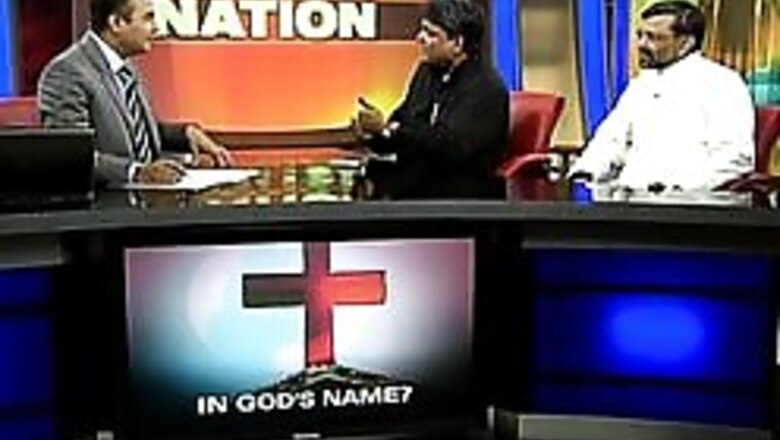
views
Orissa woke up to a bleak New Year as tension continued to simmer in the riot-hit Kandhamal district. The last week of 2007 was witness to heated communal tensions between Hindus and Christians in the state. The Christian community has alleged partisanship even in the relief distribution to the riot-affected.
According to the Catholic Bishops Conference of India five parish churches, 50 village churches and six convents and other Christian institutions were destroyed or damaged in the violence that began on December 22.
Minority communities are increasingly being targeted by the so-called protectors of Indian culture and identity. VHP activists have been blamed for at least three deaths and the burning of 60 churches in Orissa alone.
Several other states have witnessed rising crimes against Christians, with nuns being gangraped in Jhabua, Madhya Pradesh in 1998, and clergymen being attacked and churches burnt in Jharkhand and Gujarat.
Face the Nation began its innings in 2008 debating the burning issue: Should religious conversion be banned?
On the panel of experts to debate the issue were spokesperson of the RSS Ram Madhav, Spokesperson of the New Delhi Catholic Archdiocese, Father Dominic Emmanuel and Dalit author and thinker, Chandrapal Prasad.
Preaching the ‘good news’?
In a book that appeared before the Gujarat elections, Chief Minister Narendra Modi recently spoke of members of a certain community who clean human waste because that is ‘God’s job’. Such people made the choice of leaving their religion because that self-same religion symbolised for them a poor quality of life.
When asked about such a choice, RSS Spokesperson Ram Madhav disclaimed all knowledge of the statement, saying he had not read the book in question.
Expressing his regrets that 2007 ended on a conflict-ridden note, Madhav said such religious tensions were localised conflicts and, in no way, pan-Indian or a pan-Orissa phenomena.
“Basically, the reason in most cases has something to do with the business of conversion that many Christian missionaries indulge in,” he added and said in the same breath that Hindus were equally to be blamed for the violence.
“In all these conflicts, both parties are equally to be blamed, and are equally responsible,” he stated.
However, Madhav then announced that the post-Christmas violence was due to the Christian groups. “Some (groups) are more responsible, like in Orissa, it was the Christian groups that were responsible for the violence,” he said.
Fr Dominic Emmanuel was not impressed with the claim and demanded to know how many out of the one lakh people who attended Church services on Christmas at Delhi’s Sacred Heart Cathedral were converts.
“Why are these people attacking only the missionaries who try to uplift the tribals and the Dalits? Because they do not want the development of the poor people! Why don’t they come and attack us here (in Delhi)?” he demanded, adding that no one is ‘converting’ any one.
The experts agreed that the job of missionaries who work with the poor be clarified like does the Bible permit them to propagate the Christian faith to such people? Or does the Bible permit them to convert the poor?
“Propagate, preach, is not only the fundamental right. That is our mandate from Jesus Christ,” explained Fr Emmanuel. “Go and preach the good news,” he quoted.
Denying that preaching or propagating religion is the first step towards conversion, Fr Emmanuel clarified that only those people come forward who want to embrace the Christian faith. However, Madhav felt his point was being substantiated.
“There is absolute freedom for Christians to propagate their religion. But when you indulge in fraudulent conversions, there is a localised reaction,” he insisted.
He further indicated that the issue was not about poor people’s conversion. “If you are involved in fraudulent conversions in Delhi, there will be reactions in Delhi also,” he stated.
But how can the conflict be considered localised? In states across the country, even in states that have anti-conversion laws, such as Orissa, Chhattisgarh, Jharkhand and many northeastern states, there are low-caste Hindus who leave their religion because they are dissatisfied with the quality of life being offered to them.
Casteism, the main cause of conversion
“For victims of Hinduism, it is a religious evil. And anybody who wants to quit the religion has the option,” Chandrapal Prasad said.
Prasad added that ultimately it boiled down to the age-old problem of caste in the Hindu religion, which is why the lower-castes and the outcastes choose to convert.
“Hinduism is facing a crisis. It does not want to address that crisis and it tries to attack or take on other groups, which are trying to instill some hope and inspiration like Christian groups, Buddhist groups who are trying to raise the level of aspirations across the community,” he explained.
Fr Emmanuel then explained that such groups tried to give the lower caste people dignity.
Leap of Faith
Article 25 Clause 1 of the Constitution deals with religious conversion. It says, “The Constitution guarantees propagation of religion and conversion, but it allows one to spread one’s religion by only exposition of extenuates.”
“Nobody today can be converted by force or by greed. People want to escape from the trauma that they have been undergoing under a particular religion,” Prasad said.
The author was of the opinion that the consent of the Supreme Court should be very clear in this matter. “If they want to do it then and leave it to the citizen’s choice whether to quit the religion or continue with it,” Prasad said.
But Madhav retorted by saying that 90 per cent of conversions is India are through fraud means or allurement.
“Cycles are distributed, false promises are made and false Gods are presented. You must read Christian Science Monitor’s latest issue which very categorically says that the New Age Christian missionaries’ conversion zeal is responsible for all the violence,” Madhav said.
Fr Emmanuel intervened by arguing, “In this country about a 40 per cent of the people are living under the poverty line. Please do not think that missionaries are so incapable that if we were converting people by fraudulent means or allurement then you would not be able to buy this 40 per cent people back.”
So does the RSS, VHP or the Bajrang Dal accept that they have not managed to win the trust or confidence of the lower caste people and hence such problems have come up?
Madhav in defense said that people like Fr Emmanuel are merchants of religion and they sold their religion through commodities, food items and other means. “They are demeaning Christianity.”
“It is because of our work that they have been able to convert five to six per cent of the people of the country. However, they cannot go beyond this, as there is so much of welfare being done for Dalits in this country,” Madhav said.
Till the end of the debate, the panelists were divided down the middle, but all believed that the choice of religion couldn’t be legislated.
Final SMS poll results: Should religious conversions be banned?
Yes: 65 per cent
No: 35 per cent
CNN-IBN Editorial View
Religious conversion by force must not be allowed. India is a mature democracy and people must have the right to choose. Any kind of enticement to change ones religion is against the spirit of the Constitution itself. But then in a strict caste-based society like ours, difference between desire to change and change by enticement will always lead to a debate.


















Comments
0 comment